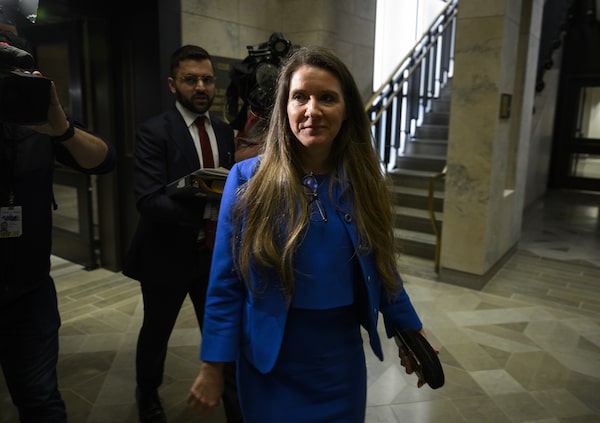
Katie Telford, chief of staff to Prime Minister Justin Trudeau, departs after appearing as a witness before the Standing Committee on Procedure and House Affairs, studying foreign election interference, on Parliament Hill in Ottawa, on April 14.Justin Tang/The Canadian Press
There is, as everyone watching probably expected, still a murky thing left unaddressed about what Canada’s spy agency told the Liberals about one of their candidates in the 2019 federal election, even after senior party officials testified at a parliamentary committee.
When Jeremy Broadhurst was asked Tuesday about what the Canadian Security Intelligence Service told the Liberals, the party’s 2019 campaign manager wouldn’t say what was said because he couldn’t reveal the contents of intelligence briefings. But he did say that he decided to inform Prime Minister Justin Trudeau about it the next day.
The Liberal Leader was in the midst of an election campaign, and had to be briefed in a secure fashion. But as it happened, Mr. Trudeau was in Ottawa the next day. (It was a Sunday.) Mr. Broadhurst said he briefed Mr. Trudeau one-on-one, “in a safe manner.” That sounds like it wasn’t just a trivial thing.
But Mr. Broadhurst effectively told the procedure and House affairs committee that CSIS did not recommend that the Liberal Party drop the candidate before he won the official nomination. He didn’t say so explicitly, but at one point he told the committee that in his experience CSIS would never do such a thing.
Mr. Broadhurst, a senior adviser to the Prime Minister who has held several senior staff roles in government, said intelligence officials provide information, but it would be inappropriate for them to tell a political party what to do about a candidate.
And he went further. Mr. Broadhurst said a Global News report that asserted that CSIS had urged the Liberal Party to drop their Don Valley North candidate, Han Dong – who was subsequently elected as an MP – was inaccurate.
Mr. Dong left the Liberal caucus in March to sit as an Independent MP. He has since launched a libel lawsuit against Global News over that story and another that alleged that he urged a Chinese diplomat not to release two Canadians, Michael Kovrig and Michael Spavor, from detention.
But Mr. Broadhurst’s testimony brought us back to a repeated pattern in this committee. The public learned a little more about what Mr. Trudeau wasn’t told, but not so much about what he was told.
Some of that is to be expected when matters of public concern tread on the ground of security intelligence, but that’s a reason for an inquiry so an independent commissioner can report to Canadians.
What else do we now know didn’t happen, according to the Prime Minister’s Office? The Prime Minister’s national security and intelligence adviser, Jody Thomas, has testified previously that a Global News report alleging that Chinese officials had funnelled money to a network of 11 candidates in the 2019 election campaign was inaccurate. Mr. Trudeau’s chief of staff, Katie Telford, recently answered questions about that allegation by pointing to Ms. Thomas’s denial.
On Tuesday, we had Mr. Broadhurst, a senior Liberal, telling Canadians that CSIS told the party something about a candidate that he decided to relay to the Prime Minister right away. But he also testified that intelligence officials didn’t urge them to drop a candidate. There is a wide space of unknown in between.
Mr. Broadhurst said he couldn’t reveal if he talked to Mr. Trudeau about whether the party should drop Mr. Dong, asserting that doing so would involve revealing the contents of intelligence briefings.
At this point, that’s just one question among many. In March, The Globe and Mail reported CSIS’s finding that Chinese diplomats had sought to organize friendly donors and paid volunteers for favoured candidates in the 2021 election, and it’s still unclear what authorities did with that information.
Fred DeLorey, who managed the Conservative campaign in 2021, said the party believes there were foreign interference attempts in several ridings – although not enough to change the outcome of the election – but the party didn’t feel like it got much of a response when it raised the issue with an intelligence committee set up for the purpose.
The former Liberal and Conservative campaign managers seemed to agree on one thing: that foreign interference is a threat to future elections. In that case, the public should get more answers about the past. It’s pretty clear now they can only come in an inquiry.